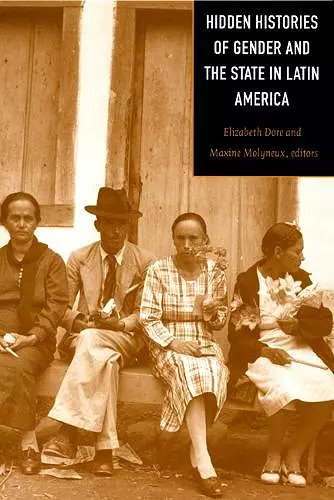Hidden Histories of Gender and the State in Latin America
Maxine Molyneux editor Elizabeth Dore editor
Format:Paperback
Publisher:Duke University Press
Currently unavailable, and unfortunately no date known when it will be back

Collection of essays which compares the gendered aspects of state formation in Latin American nations and includes new material arising out of recent feminist work in history, political science and sociology.
Examines the mutually influential interactions of gender and the state in Latin America from the late colonial period to the end of the twentieth century. This book locates watershed moments in the processes of gender construction by the organised power of the ruling classes and in the processes by which gender has conditioned state-making.This collection examines the mutually influential interactions of gender and the state in Latin America from the late colonial period to the end of the twentieth century. Locating watershed moments in the processes of gender construction by the organized power of the ruling classes and in the processes by which gender has conditioned state-making, Hidden Histories of Gender and the State in Latin America remedies the lack of such considerations in previous studies of state formation.
Along these lines, the book begins with two theoretical chapters by the editors, Elizabeth Dore and Maxine Molyneux. Dore opens by arguing against the prevailing view that the nineteenth century was marked by a gradual emancipation of women, while Molyneux considers how various Latin American state forms—liberal, corporatist, socialist, neoliberal—have more recently sought to incorporate women into their projects of social reform and modernization. These essays are followed by twelve case studies that examine how states have contributed to the normalization of male and female roles and relations. Covering an impressive breadth not only of historical time but also of geographical scope, this volume moves from Brazil to Costa Rica, from Mexico to Chile, traversing many countries in between. Contributors explore such topics as civic ritual in Bolivia, rape in war-torn Colombia, and the legal construction of patriarchy in Argentina. They examine the public regulation of domestic life, feminist lobby groups, class compromise, female slaves, and women in rural households—distinct, salient aspects of the state-gender relationship in specific countries at specific historical junctures.
By providing a richly descriptive and theoretically grounded account of the interaction between state and gender politics in Latin America, this volume contributes to an important conversation between feminists interested in the state and political scientists interested in gender. It will be valuable to such disciplines as history, sociology, international comparative studies, and Latin American studies.
Contributors. María Eugenia Chaves, Elizabeth Dore, Rebecca Earle, Jo Fisher, Laura Gotkowitz, Donna J. Guy, Fiona Macaulay,...
“This collection promises to be a thought-provoking and well-used source for the continuing debates in this field. A great asset for researchers and students alike.”—Sarah Radcliffe, University of Cambridge
“This splendid volume is unique for its analytical savvy regarding the gendered history of power, authority, and cooptation in Latin America. Each chapter provides a provocative and detailed rendering of patriarchal societies and women’s agency from spaces as varied as households and legislatures. This book will be of wide interest to specialists on the region and, far more broadly, it will spur reinvigorated theoretical debate on the tortuous relationship historically between gender and the state.”—Matthew C. Gutmann, author of The Meanings of Macho: Being a Man in Mexico City
ISBN: 9780822324690
Dimensions: unknown
Weight: 612g
400 pages